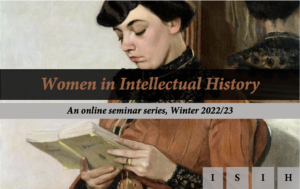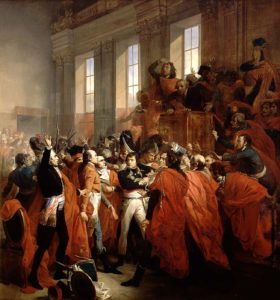Conferences
A major international conference, held at venues across the world on a regular basis, is at the heart of the Society’s activities. In this section you can find out more about our forthcoming conference, as well as information about and links to our previous meetings.
ISIH2022
The ISIH 2022 Conference, Histories of Knowledge: Political, Historical and Cultural Epistemologies in Intellectual History, will be held at Ca’ Foscari University of Venice, 12-15 September. The programme will be released shortly.
The conference addresses the knowledge-power entanglement in intellectual history, including at the level of historiography. In recent years, the Covid-19 pandemic, climate change, the growth of global inequalities, and the emergence of global conspiracy theories have brought to the fore the political dimensions of knowledge by eliciting debates on issues such as post-truth, the crisis of expertise, and the control of data and information. Drawing inspiration from the pressing issues of today’s world, #ISIH2022 will use the lens of intellectual history to explore the mutual influence of ideas stemming from the political and cultural realms, ranging from philosophy to the sciences, the arts, and literature. We also invite material and social inquiries into the political and cultural conditions that inform knowledge construction at three different levels: its roots, its validation processes, and its implications. This type of approach, which investigates the politically-informed, ever-changing historical conditions of knowledge, is what we refer to as ‘political epistemology’.
2022 John Locke Conference
The ISIH is proud to support the 2022 John Locke Conference, to be held at the American University in Bulgaria 21-23 June 2022, organised by Diego Lucci.
ECR Events
Every year, the ISIH supports a selection of events, designed by ECRs, for ECRs.
We are currently accepting expressions of interest from early career researchers who would like to organise an online event for ECRs with ISIH in 2022.
Possible formats include but are not limited to workshops and seminar series, with a topic that would engage intellectual historians from a broad range of backgrounds. ISIH provides practical support and a platform where ECRs can meet with senior scholars as well as each other to discuss work-in-progress in a constructive atmosphere.
Interested parties (which could be teams as well as individuals) are invited to contact the ISIH Early Career Representative Elias Buchetmann at elias.buchetmann@uni-rostock.de.
Past events include Coerced Labour in the Early Modern World (1500-1800): Definitions, Justifications and Resistances, organised by Giovanni Lista; New Work in Intellectual History: A Project Development Workshop Series, organised by Shiru Lim; and Women in Intellectual History, organised by Elias Buchetmann.
ECR Seminar Series: Women in Intellectual History (Early Modern Period)
The International Society for Intellectual History is pleased to announce a Call for Papers for the second instalment of its seminar series, Women in Intellectual History, which will take place onlineinlate 2022 / early 2023.
Women thinkers and their writings are still underrepresented in the discipline of intellectual history. Despite decades-long efforts at canon-busting, research agendas and teaching curricula alike attest that much work remains to be done to counteract the bias of gendered historiographies. As a prominent meeting place for practitioners of the discipline in all stages of their careers and from various parts of the world, ISIH provides an ideal forum for the discussion of recent work in this crucial area of research.
Through a series of online meetings in late 2022 / early 2023, featuring selected presentations and commentary followed by discussion, early career researchers active in the field of women’s intellectual history will be able to connect with each other and with senior scholars with matching expertise. Submissions from a broad range of specialisations—including the history of social, political, legal and economic thought, literary history, the history of philosophy, and the history of science—and across historical periods and geographical boundaries are encouraged. This second instalment of the series focuses explicitly on the early modern period, broadly conceived (from the late fifteenth to the early nineteenth century).
If you are an early career researcher and would like to participate in this seminar by giving a paper, please send an abstract (max. 300 words) and a short bio to elias.buchetmann@uni-rostock.de by 30 September 2022.
ECR Workshop: Autocracy, Revolution, and Republicanism (1789-1945)
24 November, online
In the last decade, autocratic regimes and illiberal political movements have been on the rise around the world. Recent scholarship has drawn attention to the decline of democracy and the resilience of autocracies. The goal of this workshop is to analyze and discuss the relationship between concepts of autocracy, revolution, and republicanism between 1789 and 1945. The intellectual history of autocracy is linked to ancient notions of tyranny, despotism and dictatorship. However, following the French Revolution, new concepts of autocracy emerged with the overthrow of absolute monarchy. This is true of the autocratic forms of government spearheaded by Robespierre with the Terror and by Napoleon Bonaparte with the Consulate and the coup d’état of the Eighteenth Brumaire. In the 19th century, concepts such as “Bonapartism,” “dictatorship of the saber” (Donoso Cortés), “tyranny of the majority” (Tocqueville), “dictatorship of the proletariat” (Marx and Engels), and others were developed. In Latin America, the phenomenon of caudillismo of military leaders developed in the context of the wars of independence. In the 20th century, well-known terms, including totalitarianism and fascism emerged. The Spanish Civil War and Franco’s dictatorship were the prelude to concepts such as caudillaje. Theorists like Carl Schmitt in Nazi Germany and Sergio Panunzio in fascist Italy defended autocracies in order to put an end to parliamentary democracy.
The Workshop is particularly interested in addressing the following topics:
– Models of autocratic government (from antiquity to modern times: tyranny, dictatorship, monarchy – absolutism, etc.)
– Connections between autocracy and democracy/republicanism
– Forms of autocracy (social, political, economic, etc., also gendered forms of authority, and forms of dependency, such as slavery, economic exploitation)
– Relationship between autocracy and (the absence) of rights
– Relationship between autocracy and anarchy (concepts such as popular tyranny, etc.)
We invite proposals of papers and panels. Please send your abstracts (250 to 300 words plus a panel description where applicable) and a short bio to carlos.perez.crespo@uni-hamburg.de and arianeviktoriairmgard.fichtl@unito.it by 15 September 2022.
Organizers:
Ariane Viktoria Fichtl, University of Turin
Carlos Perez-Crespo, University of Hamburg

